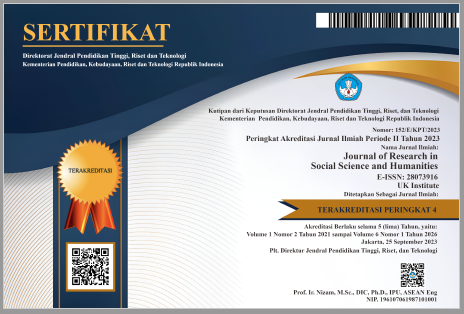*corresponding author
AbstractThe COVID-19 pandemic has revealed significant vulnerabilities in Indonesia's pharmaceutical supply chain, especially due to the very high dependence on imports of Active Pharmaceutical Ingredients (API), which reaches more than 90% of the national demand. This dependency poses risks such as distribution delays, price fluctuations, and protectionist policies from exporting countries. This condition is urgent and needs improvement to prevent disruption to the national pharmaceutical supply chain in the future. This study analyzes Indonesia's pharmaceutical supply chain post-pandemic, identify the keyrisks faced, and evaluate the role of government policies in strengthening national pharmaceutical resilience. Using a literature review method, this study examines findings from relevant journals, government reports and policy documents in the past five years. The results show that import dependency creates major risks, including distribution delays, raw material price fluctuations, and the impact of exporting countries' protectionist policies. Although the government has initiated strategic policies such as change source and domestic component level policy, their implementation still faces obstacles, such as limited local production capacity and complex regulations. Therefore, a holistic approach is needed that includes diversifying raw material sources, investing in local technology, and strengthening logistics infrastructure. In conclusion, this strategic step is not only important to reduce import dependency, but also to ensure Indonesia's future pharmaceutical resilience.
Keywordspharmaceutical supply chain; drug raw materials; pharmaceutical resilience; pharmaceutical policy
|
DOIhttps://doi.org/10.47679/jrssh.v5i1.241 |
Article metrics10.47679/jrssh.v5i1.241 Abstract views : 201 | PDF views : 63 |
Cite |
Full Text Download Download
|
References
Azzahra, Q. (2024). Kemenperin Akui 90 Persen Lebih Bahan
Baku Farmasi Masih Impor.
Bastani, P., Dehghan, Z., Kashfi, S. M., Dorosti, H.,
Mohammadpour, M., Mehralian, G., & Ravangard, R.
(2021). Strategies to improve pharmaceutical supply
chain resilience under politico-economic sanctions: the
case of Iran. Journal of Pharmaceutical Policy and Practice, 14(1). https://doi.org/10.1186/s40545-021-
-8
BPK. (2023). Undang-undang (UU) Nomor 17 Tahun 2023.
Bright Ojo. (2024). Resilience of supply chains for essential
goods and services. International Journal of Science and
Research Archive, 12(2), 2113 2123.
https://doi.org/10.30574/ijsra.2024.12.2.1480
CNN Indonesia. (2024). Kemenperin Akui RI Doyan Impor
Bahan Baku Obat dari China Dkk.
https://www.cnnindonesia.com/ekonomi/20240709172
-92-1119313/kemenperin-akui-ri-doyan-imporbahan-
baku-obat-dari-china-dkk
Direktorat Jenderal Farmasi dan Alat Kesehatan Kemenkes.
(2023). Keputusan Menteri Kesehatan Nomor
HK.01.07/MENKES/1333/2023 tentang Peningkatan
Penggunaan Sediaan Farmasi yang Menggunakan Bahan
Baku Produksi Dalam Negeri .
Ferdous, J., Medhekar, A., Akbar, D., Khandaker, G., & Hossain,
R. (2023). DEVELOPING AN ANALYTICAL FRAMEWORK
TO DEPICT DISRUPTIONS IN THE PHARMACEUTICAL
SUPPLY CHAIN DURING COVID-19: A SCOPING REVIEW.
In Australasian Journal of Regional Studies (Vol. 29, Issue
.
Francis, J. R. (2020). COVID-19: Implications for Supply Chain
Management. Frontiers of Health Services Management,
(1), 33 38.
https://doi.org/10.1097/HAP.0000000000000092
Hermawan, E., Hadiyati, N. A., Adiarso, A., Setiyadi, E. D.,
(2023). CHALLENGES AND POLICY SUPPORTS IN
INDONESIAN PHARMACEUTICAL RAW MATERIALS
INDUSTRY. Indonesian Journal of Health Administration,
(2), 196 211.
https://doi.org/10.20473/jaki.v11i2.2023.196-211
Isnaeniah, R. W., Prakoso, L. Y., & Saputro, G. E. (2023).
Pharmaceutical Industry Independence Strategy in
Supporting Defense Economic Post-Covid-19. 8(2), 674
Kapoor, D. (2018). An Overview on Pharmaceutical Supply
Chain: A Next Step towards Good Manufacturing
Practice. Drug Designing & Intellectual Properties
International Journal, 1(2).
https://doi.org/10.32474/ddipij.2018.01.000107
Kardoko, H. (2020). Revolusi Industri Farmasi di Tengah
Pandemi Covid-19.
https://ekonomi.bisnis.com/read/20201022/257/130847
/revolusi-industri-farmasi-di-tengah-pandemi-covid-
Kementerian Kesehatan. (2024). Profil Kesehatan Indonesia
Khot, U. N. (2020). Navigating Healthcare Supply Shortages
During the COVID-1
Perspective. Circulation: Cardiovascular Quality and
Outcomes, 13(6), E006801.
https://doi.org/10.1161/CIRCOUTCOMES.120.006801
Kuntardjo, C. (2020). Healthcare Logistics & Supply Chain
Management in Health Industry of Indonesia Based on
the Telemedicine. In Int. J Sup. Chain. Mgt (Vol. 9, Issue
. http://excelingtech.co.uk/
Kusnandar, V. B. (2022). Nilai dan Pertumbuhan PDB Industri
Kimia, Farmasi dan Obat Tradisional (2010-2021).
Mahendradhata, Y., Andayani, N. L. P. E., Hasri, E. T., Arifi, M. D.,
Siahaan, R. G. M., Solikha, D. A., & Ali, P. B. (2021). The
Capacity of the Indonesian Healthcare System to
Respond to COVID-19. Frontiers in Public Health, 9.
https://doi.org/10.3389/fpubh.2021.649819
Meliawati, R. (2020). Kebijakan Industri Farmasi pada Masa
Pandemi COVID-19. Jurnal Farmasi Udayana, 72.
https://doi.org/10.24843/jfu.2020.v09.i02.p02
Meyliana, Surjandy, Fernando, E., Cassandra, C., & Marjuki.
(2021). Propose Model Blockchain Technology Based
Good Manufacturing Practice Model of Pharmacy
Industry in Indonesia. 2021 2nd International
Conference on Innovative and Creative Information
Technology, ICITech 2021, 190 194.
https://doi.org/10.1109/ICITech50181.2021.9590120
Nurkartika, Andini. (2021). Revolution and Policy of the
Pharmaceutical Industry in the Middle of the Covid-19
Pandemic. https://ssrn.com/abstract=3829097
Ochonogor, K. N., Osho, G. S., Anoka, C. O., & Uwakonye, M.
(2022). The Effect of COVID-19 on Supply Chain
Management: Pre and Post-COVID-19: Case Study of
CVS Pharmacy, Inc.
Innovation Systems, 7(1), 35.
https://doi.org/10.5296/ijmis.v7i1.20408
Rizky, D. (2024, July 10). Tren Impor Bahan Baku Obat
Meningkat 5 Tahun Terakhir.
Ruskar, D., Hastuti, S., Wahyudi, H., Dewa Ketut Kerta Widana,
I., & Khoirudin Apriyadi, R. (2021). LAFIAL: Pandemi
COVID-19 Sebagai Momentum Kemandirian Industri
Farmasi Menuju Ketahanan Kesehatan Nasional.
PENDIPA Journal of Science Education, 5(3), 300 308.
https://doi.org/10.33369/pendipa.5.3.300-308
Salsabilla, R. (2024). Bahan Baku Obat Impor, Masalah
Bertahun-tahun yang tak Kunjung Selesai .
Simanjuntak, A. K. M. (2024). Obat di Indonesia Mahal, Ini
Sederet Tantangan Besar Industri Farmasi.
https://validnews.id/ekonomi/obat-di-indonesia-mahalini-
sederet-tantangan-besar-industrifarmasi?
utm_source=chatgpt.com
Sulistiadi, W. (2023). Health Policy Reform through
Journal of Indonesian Health Policy and Administration,
(3), 106. https://doi.org/10.7454/ihpa.v8i3.7321
Sutrisno, E. (2021, May 22). Potensi Besar Industri Kesehatan
Dalam Negeri .
Tarigan, Z. J. H., Siagian, H., & Jie, F. (2021). Impact of internal
integration, supply chain partnership, supply chain
agility, and supply chain resilience on sustainable
advantage. Sustainability (Switzerland), 13(10).
https://doi.org/10.3390/su13105460
Wenang, S., Schaefers, J., Afdal, A., Gufron, A., Geyer, S.,
Dewanto, I., & Haier, J. (2021). Availability and
Accessibility of Primary Care for the Remote, Rural, and
Poor Population of Indonesia. Frontiers in Public Health,
https://doi.org/10.3389/fpubh.2021.721886
Refbacks
- There are currently no refbacks.
Copyright (c) 2025 Arum Purwaning Asih

This work is licensed under a Creative Commons Attribution 4.0 International License.
______________________________________________________________________________________________
Journal of Research in Social Science And Humanities
Published by Utan Kayu Publishing
Email: jurnal.jrssh@gmail.com














